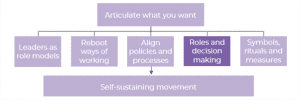
5) Roles and decision making
Our recent articles have been guiding you through how to create a deliberate culture in a hybrid world.
We have covered how to articulate what you want; how to align leaders and create a movement of advocates; how to reboot ways of working and hardwire your values through policies and processes.
This article shares tips on how to make sure your organisation’s roles, structure and approach to decision-making are positively reinforcing the culture you want.

Now is a time of radical restructuring – organisations of all sizes are re-shaping due to reduced revenue, rapid growth, or digitisation. We are finding many clients are using this impetus to create a structure they had considered before and now need more than ever.
This brings with it a huge opportunity to make organisations more empowered and inclusive. Our Silver Lining research found one of the benefits of enforced remote working is a ‘levelling up’ within organisations. Geographical location no longer holds the power it once did when decisions were habitually made in Head Office and the trappings of seniority have largely evaporated with anyone’s pets or children as likely to appear on a Zoom call.
On the other hand, we know the pandemic has drawn attention to disparities among those working remotely, including the varied quality of internet access; the demands of parenting and caring; the amount of home and outdoor space; as well as different personalities and role-types. New starters may find it difficult to build inherent knowledge of what’s going on when working remotely. They have been hired to contribute to the organisation and want to do this as soon as possible but becoming integral to decision making is hard when people habitually have their ‘go to’ people.
These factors need considering when designing future roles, structures and decision-making authority, to build a deliberate culture that will accelerate strategy delivery.
How to use roles and decision-making to shape your culture
- Challenge habitual thinking – ask yourself why a role needs to exist – its purpose in the organisation. Then articulate clearly and succinctly the contribution it makes and how this will be evidenced – to customers, other teams and the bottom line.
- Empower decision making – this is something many organisations have talked about for years and not yet achieved. Now is a great opportunity to fundamentally relook at who makes which decisions and push them ‘down the line’. The more people feel they can make decisions independently, the fewer online meetings will be needed to debate and discuss.
- Create confident decision makers – empowerment is not the same as ‘passing the buck’. To support your people to make great decisions, give them relevant skills and knowledge and the psychological support they need to feel resourceful and confident.
- Be proactively inclusive – creating a more inclusive culture often means breaking engrained beliefs and behaviours. There is a risk that post-Covid workplaces will unconsciously revert to an attitude of ‘office is best’, and side-line colleagues who continue to work remotely. Define principles that support everyone to maximise their contribution wherever they work.
- Onboard new starters well – not wanting to take up people’s time, new starters can take far longer than necessary to start contributing fully. Be proactive and structured and help your new starters to get included in appropriate decision making forums from day one.
Get in touch
To discuss how to engage everyone in your chosen future of work and build your distinctive culture call us on 01208 824 508 or at [email protected]
Follow us
Don’t miss out on the upcoming articles, follow us at https://www.linkedin.com/company/pecan-partnership
